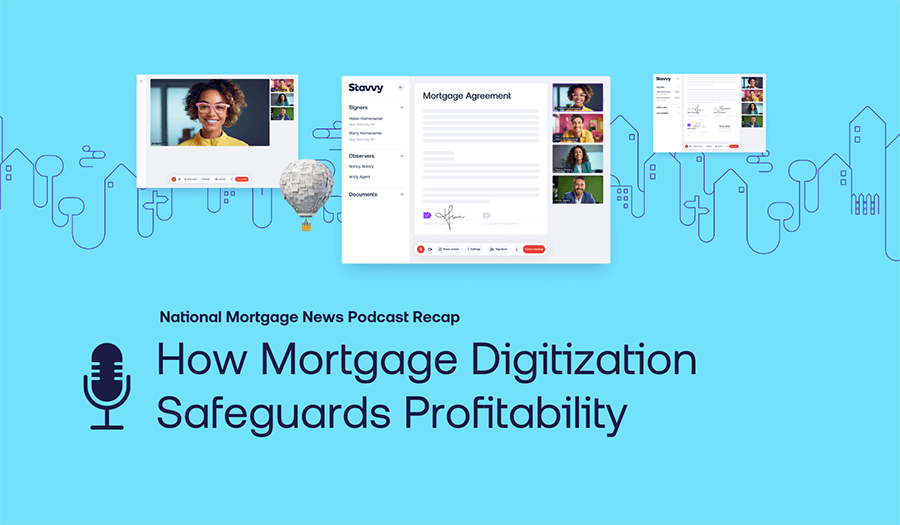Every industry has a media company that leads the way in covering the people, trends, and technologies that matter. In the housing mortgage arena, that company is increasingly HW Media, home of HousingWire. This digital-first outlet is a must-read for lenders, investors, title and settlement, tech innovators, builders, and anyone else who needs to know what’s new and what’s true.
At the helm of HousingWire, Clayton has unmatched access to the people and stories that shape the industry, making him an ideal Finside Chat guest. We’re especially pleased to get his take on what he’s seen among technology companies hoping to make an impact in the lending world.
Listen now: Innovation in Lending from a Media Perspective
Digital ebbs and flows
It’s tempting to think of digital evolution in lending as a relentless, steady force of change. But the reality has been notably uneven, with much stronger adoption of new technologies in some years than others. Clayton points out that lenders’ appetite for digitization is affected by what is going on in the whole market and on the bottom line. For instance, technology has not yet significantly reduced origination cost, although that has been the expectation for years. “Lenders are still dealing with pretty miserable margins,” he notes. “So 2020-2021, we saw this massive uptake and refi. It kind of put a band-aid on anybody's issues, it pumped cash through the P&Ls. But it also pulled away focus from innovating and implementing.”
But as the market has changed, so has the enthusiasm for innovation. “As we come into 2022, we've seen refi completely fall out the bottom. And inventory constraints are putting pressure on the purchase market,” Clayton describes, “Lenders are more focused on margin than ever, and they actually have the time to maybe change some processes and adopt some new tools and technology that help accelerate that digital future.”
They don’t all make it
Clayton is introduced to many very early stage startups with great energy and seemingly unlimited promise. Some succeed and others are colossal failures. “One of our programs is called Rising Stars. We put a gentleman on the cover of one of our magazines in 2017, and I don't know if the ink on the page had even dried yet, and that business was gone. Evaporated into the wind,” he chuckles. “It was like, alright, well, that was promising, but not every startup, not every innovator, not every lender lives to see the next day. So we take caution of super early stage companies that have yet to find some product-market fit, have some clients that are actually paying.”
This experience and others like it have helped Clayton develop a healthy and useful skepticism when he encounters new players in the industry. “I certainly have learned when to be cautious about believing somebody’s BS that they're like the next best thing since sliced bread, and they're going to innovate and disrupt and change the industry in a matter of months,” he says.
Experience matters
Clayton noticed an interesting trend among digital lending entrepreneurs that should be a cautionary tale for others seeking to enter the space. “There was a wave a few years ago where every single founder story was something like this: Well, I moved out of San Francisco to Denver, and I bought a house and it was a really painful process. So I am going to reinvent housing,” he describes. “Another person who has no knowledge of the complexities of the housing ecosystem got their first mortgage, and now they're ready to completely flip the whole industry on its head. Those stories, they're entertaining, and they play well, but when we talk about the complexity and interconnected nature of the housing market, I think it takes a very well researched business plan, the right experienced operators, and the right capital behind any technology business in mortgage housing to really reach the next stage and start to make an impact.”
“One of the fascinating things about housing is the market changes, it changes a lot. And if you forget to look up and realize what's going on, you can be operating in a really old school fashion really quickly. You see changes in origination volumes, switches between bank and non-bank, you see private investor capital flood in and private investor capital come out. The market dynamics just keep evolving. And I think the successful operators build a balance sheet that can support different market dynamics.”
- Clayton Collins
Learn more about how the  is taking real estate beyond documents.
is taking real estate beyond documents.



![[Webinar Recap] Advancing Your Digital Default Servicing Strategy](https://blog.stavvy.com/hubfs/advancing-your-digital-default-servicing-strategy-blog-recap.png)